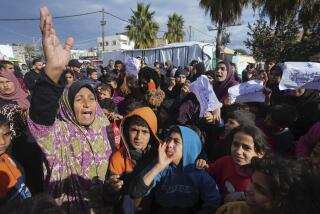Arab World Cools to Idea of Thaw With Hot-Tempered Hussein
- Share via
CAIRO — While Washington seeks to limit the damage caused this week by admissions that U.N. arms inspectors in Iraq have relied on U.S. intelligence, the Arab world has been pitched into a divisive debate over Saddam Hussein.
Many Arab commentators, moved by sympathy for the people of Iraq and appalled by U.S. tactics, say it is time that the Arab League meets to discuss rehabilitating the Iraqi regime, denounce international sanctions and condemn the continued threat of American airstrikes against Baghdad.
Several of the most important Arab governments, however, remain opposed to such a summit. If anything, their anti-Hussein resolve has hardened in recent weeks.
The negative opinion of Hussein among these Arab leaders is a result of the Iraqi president’s latest miscalculation. After the U.S.-British military action against Iraq last month, which drew widespread criticism in the Arab world, Hussein was riding on a wave of regional sympathy.
The Anglo-American airstrikes that lasted into the Islamic holy month of Ramadan infuriated ordinary Arabs.
Students in Cairo marched. Protesters in Damascus, the Syrian capital, stormed the U.S. Embassy. In the West Bank, Hussein was hailed by young Palestinians as a hero.
But somehow, in just a few weeks, Hussein has squandered that goodwill by entering into the nastiest war of words with his neighbors since the 1991 Persian Gulf War.
Hostile propaganda--including cartoons lampooning Arab leaders and a speech by Hussein this week calling for popular revolts to overthrow the region’s “throne dwarfs”--has boomeranged against the Iraqi regime, eroding much of the sympathy from the masses gained during the airstrikes.
Instead of getting closer to rehabilitation in the Arab world, the Iraqi leader finds himself being excoriated in terms rarely heard since the Gulf War. Egyptian radio, for instance, described him as a “butcher” and the worst Arab leader ever. Several Saudi newspapers have renewed calls for Hussein to be toppled.
Arab states that had seemed to be moving toward a thaw with Baghdad are having second thoughts.
For the first time, an Egyptian government envoy officially received representatives of an Iraqi opposition group--the Iraqi National Accord--whose avowed aim is to remove Hussein by a coup.
As a result, analysts say Iraq is as isolated as it was before the attacks, and perhaps even more vulnerable to U.S. attempts to topple the regime.
By lashing out with insults and calls for revolution, critics say, Hussein has done himself more harm than good. Analysts say he is confusing the sympathy felt for the Iraqi people in the Arab world with support for him personally and for his regime.
“It is true that the Arab peoples are not exactly enamored with their rulers, but the ‘masses’ are certainly not in love with Saddam and his leadership,” Abdelwahhab Badrakhan wrote in the Saudi-owned pan-Arab newspaper Al Hayat.
“There was a miscalculation by the Iraqi regime about Arab public reaction to the U.S. and British strikes,” said Egyptian political scientist Nabil Abdel Fattah, interviewed in Cairo.
“The Iraqi leader thought he could be another Nasser, rallying the Arab masses the same way Nasser turned his military defeat in 1956 into a political victory,” Fattah said, referring to the late Egyptian leader Gamal Abdel Nasser’s moves after war with Israel.
Instead, Fattah said, most people in the region are ignoring Hussein’s declarations against other Arab regimes, while the governments themselves have become angry.
The bluster began shortly after the bombings ended in December.
First, Iraqi Deputy Prime Minister Tarik Aziz took on Jordanian Crown Prince Hassan, saying he had failed to condemn U.S. military action in a speech to the Arab Parliamentary Union.
Then, Iraqi newspapers began dumping on Egyptian President Hosni Mubarak for having said the Iraqi leadership was the main party to blame for the sufferings of the Iraqi people.
Babel, an Iraqi newspaper published by Hussein’s son, Uday, added to the invective by printing a cartoon showing Mubarak as a belly dancer performing to music played by Arab Gulf leaders, with President Clinton and Secretary of State Madeleine Albright applauding.
Behind the harsh Iraqi words was bitter disappointment that a meeting of Arab League foreign ministers, which was supposed to arrange for a full Arab League summit about Iraq, was postponed from Dec. 30 until Jan. 24. The delay was perceived in Iraq as a U.S.-instigated plot to keep the 22 Arab League nations from rallying to the Hussein regime’s defense.
Yemen, traditionally sympathetic to the government in Baghdad, had first proposed the Arab summit in late December as a forum for Arabs to show support for Iraq. At the time, many governments in the region appeared ready to jump on the rehabilitation bandwagon.
But now, especially after the insults hurled in the past week at Saudi Arabia, Egypt and the Gulf emirates, chances of such a summit even taking place, much less acting decisively in Iraq’s favor, appear to be diminished considerably.
That alarms the region’s Iraq sympathizers, who say the recent revelations about U.S. intelligence and the U.N. weapons inspectors tend to vindicate the Iraqi leadership and warn that Arab silence now is bound to encourage Washington to resort to force again, perhaps as soon as Ramadan ends later this month.
Arabs will end up waiting “in utter passivity for the next chapter of the crime to unfold,” Bahraini newspaper columnist Hafedh Ash-Sheikh said.
If the U.S. does launch airstrikes again, some commentators expect that the level of protest in the Arab world will be less because many people are losing patience with the Iraqi leader.
“The masses do not sympathize with Saddam,” said Egypt’s semiofficial newspaper, Al Ahram, “and they have the sense to recognize that Saddam is playing his last, losing card.”
More to Read
Sign up for Essential California
The most important California stories and recommendations in your inbox every morning.
You may occasionally receive promotional content from the Los Angeles Times.













